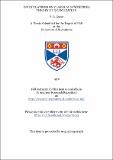Investigations on classical symmetries theory of quantization
Abstract
The thesis divides naturally into two parts. Part I raises, and in some cases answers, questions concerning symmetry in classical mechanics. The main result (Theorem 6.4) shows that the assumption of the existence of a realization puts an upper limit on the rank of the algebra.
The heart of the thesis (covering three-quarters of the volume) is section II on the quantization of classical systems. §1 lists axioms desirable in any quantization rule for the 'functions of the q's'. The momentum observables are introduced in §2 prior to their quantization in §4. §5 essentially shows how conventional quantum mechanics fits into this scheme of things. By progressive specialization from a general manifold to a vector space, from a general quantization scheme to one which is linear on the linear momentum functions, and finally to an entirely well-behaved (admissible) quantization rule, into which conventional quantum mechanics fits nicely, we obtain in §7-§9 results which become progressively more and more powerful. The final theorem (Theorem 9.2) is perhaps the most significant of all. This result states that there exists a class of functions, which contains all functions of the q's and functions of the p's and all momentum observables and which is closed with respect to any linear canonical transformation L; a rule A assigning a unique self-adjoint operator to each such function f; a unitary operator WL corresponding to L and an equation
𝛬(𝑓 ∘ 𝐿) = 𝑊[sub]𝐿⁻ 𝛬 𝑓 𝑊[sub]𝐿
Type
Thesis, PhD Doctor of Philosophy
Collections
Items in the St Andrews Research Repository are protected by copyright, with all rights reserved, unless otherwise indicated.

